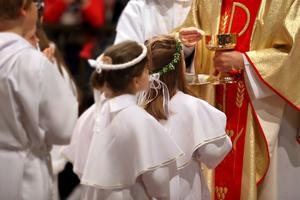Brideshead and Beyond: The Genius of Evelyn Waugh
Evelyn Waugh died on Easter Sunday — a sign of divine mercy on all those who embrace their suffering with faith and fortitude.

Conversion is like stepping across the chimney piece out of a Looking-Glass world, where everything is an absurd caricature, into the real world God made; and then begins the delicious process of exploring it limitlessly.
These wonderful words of Evelyn Waugh, referring to his conversion to Catholicism, are so powerful and so succinctly expressive of the seismic shift of perspective that conversion brings, that I selected them to serve as the epigraph to my book, Literary Converts.
Every convert knows that stepping across the threshold into the life and light of Christ is more than simply lifechanging. It is life giving. And, what is more, it is also light giving. It gives life to those who had been in a living death and gives light to those who had been groping in the dark.
Waugh crossed the threshold into the life and light of Christ on Sept. 29, 1930, being received at the Church of the Immaculate Conception in London by the famously erudite Jesuit, Father Martin D’Arcy, the inspiration for the character of Father Mowbray in Brideshead Revisited. He remained thereafter a faithful son of Holy Mother Church, though few would venture to suggest that he lived the life of a saint. His post-conversion novels, baptized with the beauty of the Catholic aesthetic and conveying the realism of the Catholic understanding of good and evil, satirize the “Looking-glass world” of the modern wasteland, “where everything is an absurd caricature.” They expose its hedonism as hollow, as nothing but a vacuous viciousness devoid of virtue and veritas, and its philosophy as fatuous, offering nothing but futility. They illustrate all too grimly that nihilistic fatalism is truly fatal insofar as it heralds the suicide of thought and the culture of death which is its consequence.
Waugh’s fiction is full of the sort of vacuous modern man whom Eliot satirizes so sardonically in his poetry. “Do You know nothing?” Eliot asks the denizens of the wasteland. “Do you see nothing? Do you remember Nothing?” And he seems to answer his own question in “The Hollow Men”:
We are the hollow men
We are the stuffed men
Leaning together
Headpiece filled with straw. Alas!
Our dried voices, when
We whisper together
Are quiet and meaningless
As wind in dry grass...
Waugh’s own fictional wastelands are full of such hollow men. We think of Ted and Brenda Last in A Handful of Dust, of Hooper and Rex Mottram in Brideshead Revisited, or of Guy Crouchback’s ex-wife Virginia in Sword of Honour, to name but a representative few. And yet Waugh’s works do not derive their depth of applicable meaning from the shallows and the shadows of the hollow men he satirizes but in the presence of grace working in the lives of those whose consciences are alive to its power. This is made most apparent in Waugh’s assertion in the preface to the second edition of Brideshead Revisited that the novel’s theme is “the operation of divine grace on a group of diverse but closely connected characters.” Conceding that such a theme “was perhaps presumptuously large” he added that he made “no apology for it.”
In Brideshead, as in Sword of Honour, the acceptance of God’s grace is inextricably connected to the acceptance of suffering. In the former work, two violent metaphors are employed to signify the presence and power of grace. The first of these, “a twitch upon the thread,” which is the title of the second part of the novel, was plucked from a Chesterton story in which Father Brown explains that God can bring the sinner back to Him, regardless of how far the sinner had wandered, by a “twitch upon the thread.” The second metaphor signifies grace as being an avalanche that utterly destroys the little world, the “arctic hut,” of the sinner, leaving him with nothing except grace itself with which to rebuild his life.
In Sword of Honour it is Guy Crouchback’s decision to remarry his ex-wife, the ironically named Virginia, who is pregnant with another man’s child, which constitutes the act of self-sacrificial love, wedded to suffering, to which grace has called him. In laying down his own life for the unborn child, Guy accepts and embraces the gift of grace which is all the more beautiful because it is crowned with thorns.
The final years of Waugh’s life were overshadowed by his dismay at the rise of modernism in the Church, especially with respect to the liturgical changes of the 1960s. He carried the burden of these changes as a personal cross, wearing the loss he felt at the abandonment of Tradition as a crown of thorns. He died, newly shriven and having just received Communion, on Easter Sunday, a real-life metaphor for grace signaling the mercy of God on all those who accept and embrace their suffering with faith and fortitude. It is surely a sign of God’s sense of humour, and of Providence being a Divine comedy, that Waugh’s life should end with a metaphorical sign of grace that might have belonged in one of his novels. It shows that truth is stranger than fiction and that it has a happier ending.
- Keywords:
- evelyn waugh
















